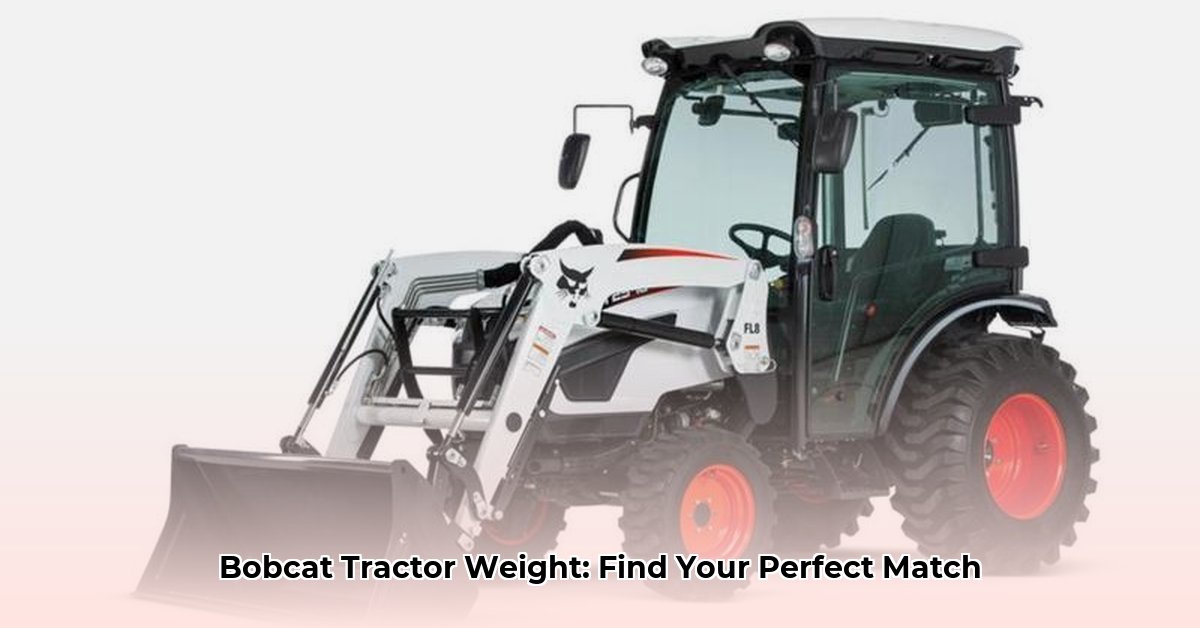
Choosing the right Bobcat tractor is crucial for efficient and sustainable farming. This guide helps you select the perfect model by focusing on weight, power, and fuel efficiency, critical factors for minimizing environmental impact and maximizing productivity. We'll explore different Bobcat tractor weight classes and how they relate to specific farming needs. For more tractor options, check out this helpful resource.
Understanding Bobcat Tractor Weight Classes
Bobcat tractors are categorized into series (e.g., 1000, 2000, 4000, and 5000), each with a distinct weight range reflecting its power and capabilities. This weight directly impacts the tractor's suitability for various tasks and farm sizes. A lighter tractor is ideal for smaller fields and delicate work, minimizing soil compaction, while heavier tractors excel in larger operations demanding high power and lifting capacity.
Matching Weight to Farming Needs
The weight of your Bobcat tractor should directly correlate with your farm's size and tasks. A small farm focusing on precision agriculture might benefit from a lighter 1000 series tractor, while a large-scale operation will require the power and capacity of a heavier 5000 series model.
"Choosing the right weight class prevents soil compaction and ensures efficient operation," says Dr. Emily Carter, Agricultural Engineering Professor at Purdue University. "Overpowering a small farm with a heavy machine is just as inefficient as underpowering a large operation."
Here's a helpful guide, but always consult official Bobcat specifications for precise weight and capability details:
| Weight Class | Approximate Weight Range (lbs) | Ideal Applications | Considerations |
|---|---|---|---|
| 1000 Series | 700 - 2,000 | Small farms, precision agriculture, light tasks | Limited lifting capacity; may not handle larger implements. |
| 2000 Series | 2,000 - 4,000 | Medium-sized farms, versatile tasks, moderate tillage | Good balance of power and maneuverability. |
| 4000 Series | 4,000 - 6,000 | Larger farms, heavier implements, extensive tillage | More powerful but less maneuverable than lighter models. |
| 5000 Series | 6,000 - 10,000+ | Large-scale operations, heavy-duty implements | High power and lifting capacity but reduced maneuverability. |
Fuel Efficiency and Environmental Impact: A Key Consideration for Sustainable Farming
While weight is crucial, fuel efficiency and environmental impact are equally important for sustainable farming. Heavier tractors generally consume more fuel, directly impacting operating costs and carbon footprint. While diesel engines often offer better fuel economy than gasoline for agricultural tasks, the actual fuel consumption depends on factors such as engine size, workload intensity, and operational techniques.
Optimizing Fuel Efficiency with Technology and Practices
Modern Bobcat tractors incorporate technologies like advanced engine management systems and efficient transmissions to enhance fuel economy. Precision farming techniques, such as GPS-guided operation and variable-rate application, further minimize fuel waste by avoiding overlaps and optimizing resource utilization.
"Precision farming technologies can significantly reduce fuel consumption by up to 20%," notes Mark Olsen, Chief Sustainability Officer at a leading agricultural technology firm. "The key is to optimize every aspect of operation for maximum efficiency."
A Step-by-Step Guide to Choosing Your Bobcat Tractor
- Assess your farming needs: What tasks will the tractor primarily perform? What is the size of your fields?
- Research Bobcat models: Explore the different series and models, considering their weight and power specifications.
- Compare specifications: Focus not only on horsepower but also on fuel efficiency ratings and environmental impact information from the manufacturer.
- Consult with dealerships: Seek detailed information on fuel consumption, operational costs and maintenance requirements.
- Consider long-term costs: Factor in fuel expenses, maintenance, and potential environmental concerns when evaluating the overall cost of ownership.
Choosing the right Bobcat tractor is an investment in your farm's productivity and environmental sustainability. By carefully considering these factors, you can make an informed decision that benefits both your business and the planet.